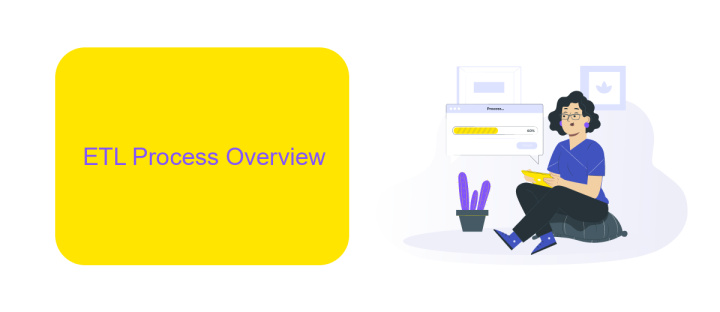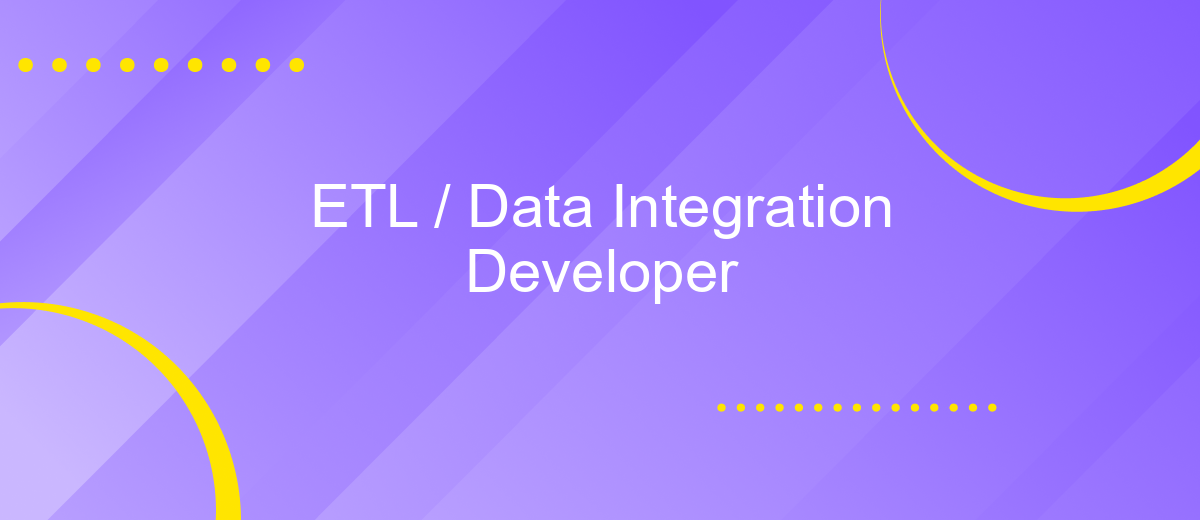ETL / Data Integration Developer
In today's data-driven world, the role of an ETL/Data Integration Developer has become increasingly vital. These professionals are responsible for designing, building, and maintaining systems that ensure seamless data flow across various platforms. By transforming and integrating data, they enable organizations to make informed decisions, optimize operations, and drive innovation. Discover the essential skills, tools, and best practices that define this critical role.
Introduction
The role of an ETL/Data Integration Developer is critical in the modern data-driven landscape. These professionals are responsible for designing, developing, and maintaining robust data pipelines that extract, transform, and load (ETL) data from various sources into centralized data warehouses or data lakes. Their work ensures that data is clean, consistent, and readily available for analysis and decision-making.
- Designing and implementing ETL processes
- Ensuring data quality and consistency
- Collaborating with data analysts and business stakeholders
- Utilizing tools and platforms like ApiX-Drive for seamless data integration
ETL/Data Integration Developers often leverage advanced tools and services to streamline the integration process. For example, ApiX-Drive offers a user-friendly platform that automates data transfers between various applications and services, reducing manual effort and minimizing errors. By employing such technologies, developers can focus more on optimizing data workflows and improving overall data strategy.
ETL Process Overview

The ETL (Extract, Transform, Load) process is a fundamental component of data integration, enabling the seamless flow of data from various sources into a unified data warehouse. During the extraction phase, data is collected from multiple origins, such as databases, APIs, and flat files. This raw data is then transformed to meet specific business requirements, which often involves cleaning, filtering, and aggregating the data to ensure consistency and accuracy.
In the final loading phase, the transformed data is loaded into a target system, typically a data warehouse or data lake, where it can be easily accessed for analysis and reporting. Tools like ApiX-Drive can significantly streamline this process by automating data integration tasks, reducing manual effort, and ensuring real-time data synchronization. ApiX-Drive supports a wide range of data sources and destinations, making it an invaluable asset for ETL developers aiming to build robust and efficient data pipelines.
Data Integration Techniques

Data integration is a crucial aspect of modern data management, enabling seamless communication between disparate systems. There are several techniques employed to achieve effective data integration, each with its own unique advantages and applications.
- ETL (Extract, Transform, Load): This traditional method involves extracting data from various sources, transforming it into a suitable format, and then loading it into a target system.
- ELT (Extract, Load, Transform): Similar to ETL, but the transformation process occurs after loading the data into the target system, leveraging the target system's processing power.
- Data Virtualization: This technique allows real-time access to data without moving it, providing a unified view of data from multiple sources.
- API Integration: APIs facilitate direct communication between systems, enabling real-time data exchange and automation. Tools like ApiX-Drive simplify the setup and management of API integrations.
Choosing the right data integration technique depends on various factors such as the complexity of the data sources, the required data latency, and the specific business needs. Leveraging tools like ApiX-Drive can significantly streamline the integration process, making it easier to connect and automate workflows across different platforms.
Tools and Technologies

As an ETL/Data Integration Developer, you will work with a variety of tools and technologies to efficiently extract, transform, and load data. These tools are designed to streamline data workflows and ensure seamless integration between different data sources and destinations.
One of the key aspects of this role is choosing the right tools for the job. The selection of tools depends on the specific requirements of the project, such as data volume, complexity, and the need for real-time processing. Modern ETL tools offer a wide range of functionalities that can be tailored to meet these needs.
- Apache NiFi: for data flow automation
- Talend: for comprehensive data integration solutions
- Informatica PowerCenter: for enterprise-level ETL processes
- ApiX-Drive: for setting up and managing data integrations effortlessly
- Microsoft SQL Server Integration Services (SSIS): for robust data transformation
ApiX-Drive, in particular, stands out for its user-friendly interface and ability to connect various applications without requiring extensive coding knowledge. This makes it an excellent choice for businesses looking to streamline their data integration processes quickly and efficiently. Utilizing these tools, an ETL/Data Integration Developer can ensure data integrity and support informed decision-making within an organization.
Career and Skills
A career as an ETL/Data Integration Developer involves designing, implementing, and optimizing processes that extract, transform, and load data from various sources into a centralized data warehouse. This role demands proficiency in SQL, data modeling, and scripting languages such as Python or Java. Familiarity with ETL tools like Apache Nifi, Talend, and Informatica is essential. Developers must also understand data warehousing concepts and possess strong problem-solving skills to address data quality issues and ensure seamless data integration.
In addition to technical expertise, ETL/Data Integration Developers should be adept at collaborating with cross-functional teams to understand data requirements and provide actionable insights. Knowledge of cloud platforms like AWS, Azure, or Google Cloud can be beneficial. Tools like ApiX-Drive can simplify the integration process by automating data workflows and connecting various applications. Continuous learning and staying updated with the latest industry trends are crucial for success in this ever-evolving field.
FAQ
What is ETL and how does it work?
What are the key skills required for an ETL/Data Integration Developer?
How do you ensure data quality in ETL processes?
Can ETL processes be automated?
What are the challenges faced in ETL and data integration projects?
Time is the most valuable resource for business today. Almost half of it is wasted on routine tasks. Your employees are constantly forced to perform monotonous tasks that are difficult to classify as important and specialized. You can leave everything as it is by hiring additional employees, or you can automate most of the business processes using the ApiX-Drive online connector to get rid of unnecessary time and money expenses once and for all. The choice is yours!

